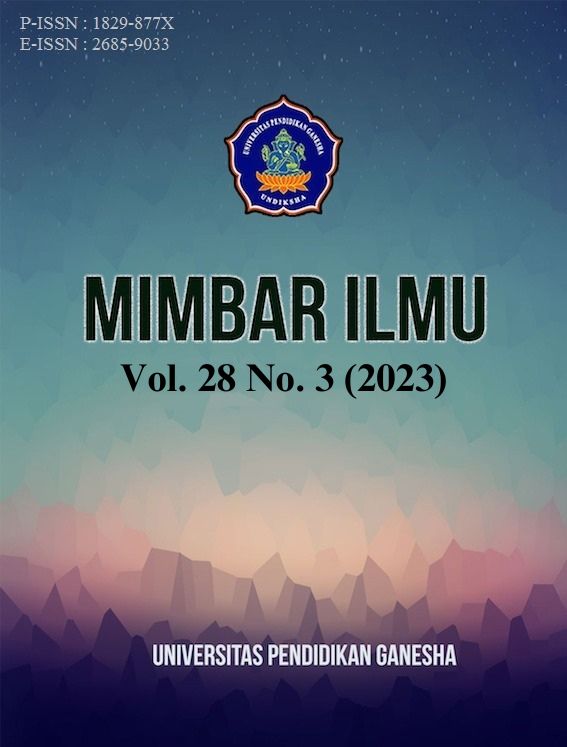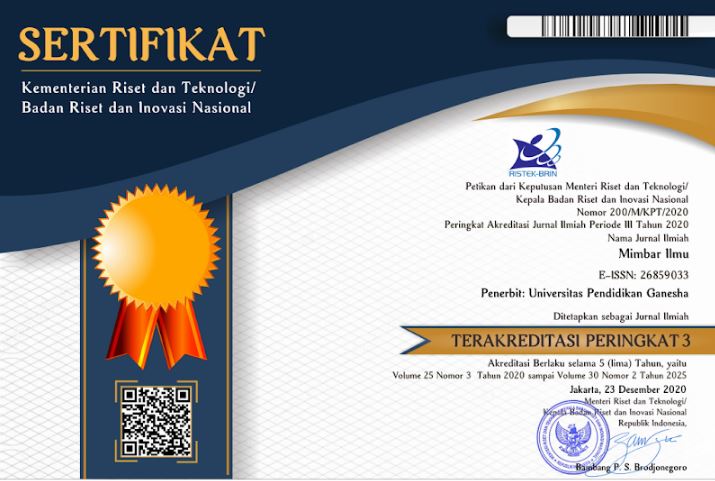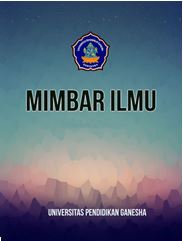The Death of Kedis Cangak for Its Greedy (Function And Values Analysis)
DOI:
https://doi.org/10.23887/mi.v28i3.67621Keywords:
Satua Kedis Cangak, Function, ValueAbstract
Balinese society is affluent in oral literature, among which there are satua or Balinese folk tales. Recently, it has been felt that the Masatua tradition has declined dramatically. The increasingly busy level of parents causes this. Entertainment on social media has defeated oral traditions. This research aims to analyze the function and value of the Death of Kedis Cangak for Its Greedy. This study uses a qualitative method. The data collection method for this research is the observation method using reading and note-taking techniques. The research results were analyzed using analytical descriptive methods and presented using informal processes. The research analysis uses the matching process. The research results show that the functions of the "Death of Kedis Cangak for Its Greedy" unit are entertainment, educational, and social sanctions or punishment functions. Values analysis, which focuses on religious values, found values such as tattwa (philosophy) and moral values (ethics). There is an entertainment function, an educational function, and a social sanction or punishment function. Values such as tattwa (philosophy) and moral values (ethics) are found in value analysis, which focuses on religious matters. Regarding philosophical issues, we found the application of the karma phala law, one of the Panca Sradha teachings. The law of karma befalls the character I Kedis Cangak. The value of morals is also reflected in the behavior of the main character, which is contrary to the teachings of morals.
References
Abidin, Y., Mulyati, T., Yuniarti, Y., & Nurhuda, T. F. (2021). Revitalisasi Cerita Rakyat Berbasis Teknologi Mixed Reality di Sekolah Dasar. Jurnal Elementaria Edukasia, 4(2), 215–225. https://doi.org/10.31949/jee.v4i2.3335. DOI: https://doi.org/10.31949/jee.v4i2.3335
Ardhyantama, V. (2017). Pendidikan Karakter Melalui Cerita Rakyat Pada Siswa Sekolah Dasar. Indonesian Journal of Primary Education, 1(2), 95. https://doi.org/10.17509/ijpe.v1i2.10819. DOI: https://doi.org/10.17509/ijpe.v1i2.10819
Ardiana, D. P. Y., & Pandawana, I. D. G. A. (2017). Aplikasi Game Cerita Rakyat Bali Sebagai Sarana Pendidikan Karakter Anak Berbasis Mobile. Lontar Komputer : Jurnal Ilmiah Teknologi Informasi, 8(3), 208. https://doi.org/10.24843/lkjiti.2017.v08.i03.p07. DOI: https://doi.org/10.24843/LKJITI.2017.v08.i03.p07
Baka, T. A., Laksana, D. N. L., & Dhiu, K. D. (2019). Konten Dan Konteks Budaya Lokal Ngada Sebagai Bahan Ajar Tematik Di Sekolah Dasar. Journal of Education Technology, 2(2), 46. https://doi.org/10.23887/jet.v2i2.16181. DOI: https://doi.org/10.23887/jet.v2i2.16181
Bulan, A., & Hasan, H. (2020). Analisis Nilai Pendidikan Karakter dalam Kumpulan Dongeng Suku Mbojo. Ainara Journal (Jurnal Penelitian Dan PKM Bidang Ilmu Pendidikan), 1(1), 31–38. https://doi.org/10.54371/ainj.v1i1.11. DOI: https://doi.org/10.54371/ainj.v1i1.11
Feriana, C., Rachman, A., & Kurniawan, R. A. (2022). Pembuatan Animasi Pendek 2D Cerita Rakyat Timun Mas. Jurnal Desain, 10(1), 61. https://doi.org/10.30998/jd.v10i1.13063. DOI: https://doi.org/10.30998/jd.v10i1.13063
Galuh, A. D., Maharani, D., Meynawati, L., Anggraeni, D., & Furnamasari, Y. F. (2021). Urgensi Nilai dan Moral dalam Upaya Meningkatkan Pendidikan Karakter Melalui Pembelajaran Pkn di Sekolah Dasar. Jurnal Basicedu, 5(6), 5169–5178. https://doi.org/10.31004/basicedu.v5i6.1598. DOI: https://doi.org/10.31004/basicedu.v5i6.1598
Handayani, L. (2020). Pengembangan Buku Cerita Berbasis Pendidikan Karakter pada Ranah Sekolah bagi Siswa SMP Kelas VII di Kabupaten Kendal. Piwulang : Jurnal Pendidikan Bahasa Jawa, 8(2), 107–115. https://doi.org/10.15294/piwulang.v8i2.33494. DOI: https://doi.org/10.15294/piwulang.v8i2.33494
Indrawan, I. P. O., & Mahendra, I. G. J. (2021). E-Learning Terintegrasi Kearifan Lokal Bali Berbasis 4c pada Mata Pelajaran IPA. Jurnal Pedagogi Dan Pembelajaran, 4(3), 511–521. https://doi.org/10.23887/jp2.v4i3.41415. DOI: https://doi.org/10.23887/jp2.v4i3.41415
Kharis, A., Permana, A., Purba, E. S., Fuadah, R. Y., Angraeni, S. S., & Aryani, A. (2021). Penguatan Literasi Melalui Cerpen Dan Dongeng. KENDURI: Jurnal Pengabdian Dan Pemberdayaan Masyarakat, 1(2), 66–71. https://siducat.org/index.php/kenduri/article/view/344.
Margunayasa, I. G. (2021). Pembelajaran Berbasis Nilai Karakter dalam Satua Bali. Jurnal Pendidikan AURA (Anak Usia Raudhatul Atfhal), 2(1). https://doi.org/10.37216/aura.v2i1.460. DOI: https://doi.org/10.37216/aura.v2i1.460
Muhdaliha, B., & Batuaya, D. R. D. (2017). Film Animasi 2 Dimensi Cerita Rakyat Bali Berjudul I Ceker Cipak. Jurnal Bahasa Rupa, 1(1), 61–72. https://doi.org/10.31598/bahasarupa.v1i1.143. DOI: https://doi.org/10.31598/bahasarupa.v1i1.143
Muslihati. (2019). Peran Bimbingan dan Konseling dalam Penguatan Pendidikan Karakter di Sekolah Menengah Kejuruan. Jurnal Kajian Bimbingan Dan Konseling, 4(3), 101 – 108. https://doi.org/10.17977/um001v4i32019p101. DOI: https://doi.org/10.17977/um001v4i32019p101
Noviasri, R. (2020). Perancangan Buku Cerita Bergambar “Petualangan Anak Pesisir: Ksatria Masin” Sebagai Media Pengenalan Makanan Khas Gresik Untuk Anak-Anak. Ultimart: Jurnal Komunikasi Visual, 12(2), 34–40. https://doi.org/10.31937/ultimart.v12i2.1440. DOI: https://doi.org/10.31937/ultimart.v12i2.1440
Parmajaya, I. P. G. (2020). Penguatan Pendidikan Karakter Berbasis Kearifan Lokal Tri Hita Karana Para Siswa Hindu. Widyacarya: Jurnal Pendidikan, Agama & Budaya, 11–17.
Pujaastawa, & Suwena, I. W. (2019). Kearifan Lokal Di Balik Mitos Lembu Putih Di Desa Taro , Gianyar. Harmonia - Journal of Arts Research and Education, 1(1), 430–440.
Ramdhani, S., Yuliastri, N. A., Sari, S. D., & Hasriah, S. (2019). Penanaman Nilai-Nilai Karakter melalui Kegiatan Storytelling dengan Menggunakan Cerita Rakyat Sasak pada Anak Usia Dini. Jurnal Obsesi : Jurnal Pendidikan Anak Usia Dini, 3(1), 153. https://doi.org/10.31004/obsesi.v3i1.108. DOI: https://doi.org/10.31004/obsesi.v3i1.108
Rukiyah, R. (2018). Dongeng, Mendongeng, dan Manfaatnya. Anuva, 2(1), 99. https://doi.org/10.14710/anuva.2.1.99-106. DOI: https://doi.org/10.14710/anuva.2.1.99-106
Sukarniti, N. L. K. (2020). Pewarisan Nilai-Nilai Kearifan Lokal Untuk Memproteksi Masyarakat Bali Dari Dampak Kemajuan Teknologi. Jurnal Ilmiah Cakrawarti, 3(1), 39–50. https://doi.org/10.47532/jic.v3i1.135. DOI: https://doi.org/10.47532/jic.v3i1.135
Umri, C. A., & Syah, E. F. (2021). Nilai-Nilai Budaya Dalam Cerita Rakyat Baturaden Pada Masyarakat Banyumas Sebagai Alternatif Bahan Ajar Sastra Di Sekolah Dasar. Jurnal Pendidikan Guru Sekolah Dasar, 4(2), 93–100. https://doi.org/10.37150/perseda.v4i2.1261. DOI: https://doi.org/10.37150/perseda.v4i2.1261
Wardani, N. W. W., & Putra, I. (2022). Perancangan Film Animasi 2D Cerita Rakyat Bali “Balapan Menjangan Dan Siput.” Jurnal Manajemen, 12(2), 136–143. https://ojs.mahadewa.ac.id/index.php/jmti/article/view/2094.
Wardani, W. P, & Suniasih, N. W. (2022). E-LKPD Interaktif Berbasis Kearifan Lokal pada Materi Aksara Bali Kelas V Sekolah Dasar. Mimbar Ilmu, 27(1), 173–182. https://doi.org/10.23887/mi.v27i1.44586.
Wardani, Winda Pradika, & Suniasih, N. W. (2022). E-LKPD Interaktif Berbasis Kearifan Lokal pada Materi Aksara Bali Kelas V Sekolah Dasar. Mimbar Ilmu, 27(1), 173–182. https://doi.org/10.23887/mi.v27i1.44586. DOI: https://doi.org/10.23887/mi.v27i1.44586
Yuniarti, I., Karma, I. N., & Istiningsih, S. (2021). Pengembangan Modul Pembelajaran Berbasis Kearifan Lokal Tema Cita-Citaku Subtema Aku dan Cita-Citaku Kelas IV. Jurnal Ilmiah Profesi Pendidikan, 6(4), 691–697. https://doi.org/10.29303/jipp.v6i4.318. DOI: https://doi.org/10.29303/jipp.v6i4.318
Downloads
Published
How to Cite
Issue
Section
License
Copyright (c) 2023 Ni Made Suarningsih, I Nyoman Suwija, I Ketut Suar Adnyana, Anak Agung Gede Putera Semadi, I Gusti Agung Laksmi Swaryputri

This work is licensed under a Creative Commons Attribution-ShareAlike 4.0 International License.
This work is licensed under a Creative Commons Attribution-ShareAlike 4.0 International License.
Authors who publish with this journal agree to the following terms:
- Authors retain copyright and grant the journal right of first publication with the work simultaneously licensed under a Creative Commons Attribution License that allows others to share the work with an acknowledgment of the work's authorship and initial publication in this journal.
- Authors are able to enter into separate, additional contractual arrangements for the non-exclusive distribution of the journal's published version of the work (e.g., post it to an institutional repository or publish it in a book), with an acknowledgment of its initial publication in this journal.
- Authors are permitted and encouraged to post their work online (e.g., in institutional repositories or on their website) prior to and during the submission process, as it can lead to productive exchanges, as well as earlier and greater citation of published work.









